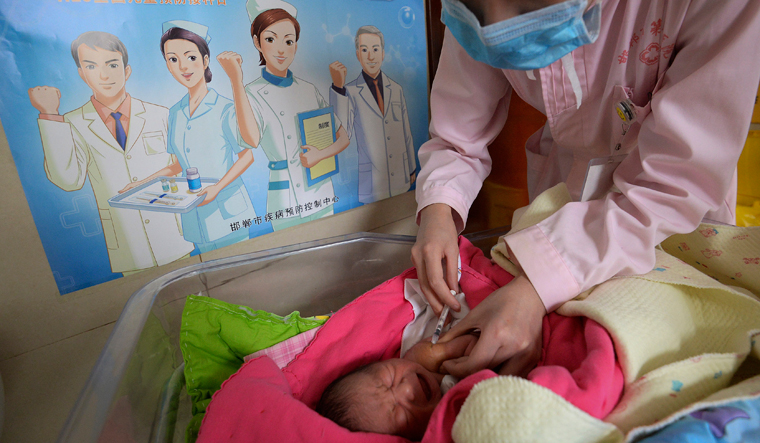Fewer people are getting married in China in addition to the falling birth rates, hastening the demographic crisis in the world's most populous country, according to an official data.
The number of marriage registrations in China has fallen for seven consecutive years and hit a 17-year low last year, figures from the recently released China Statistical Yearbook 2021 showed.
A total of 5.87 million couples got married in China in the first three quarters of 2021, down slightly from the same period of last year, according to the data released by the Ministry of Civil Affairs.
It is expected that the number of marriage registrations in China will continue to decline in 2021, state-run China Daily reported on Wednesday.
This is in addition to the falling birth rates. The birth-rate in China last year was 0.852 percent, falling below one percent for the first time since 1978, figures from the China Statistical Yearbook 2021 book revealed.
As the demographic crisis deepened, China has permitted all couples to have two children in 2016, scrapping the draconian decades-old one-child policy and revised it this year permitting three children, which however drew a poor response.
The decision to permit the third child came after the latest once-in-a-decade census showed that China's population grew at the slowest pace to 1.412 billion amid official projections that the decline may begin as early as next year.
Outlining the reasons for the falling marriage registrations, He Yafu, a demographic expert identified decline in the number of young people in China as one of the reasons.
The population of the post-80s, post-90s and post-2000s in China has been on the decline, he said, citing the National Bureau of Statistics.
Also, the desire of young people to get married has generally fallen due to reasons such as high work pressure and great improvement in women's education level and economic independence, he told the China Daily.
Another major reason is the unbalanced ratio of male and female population. In China, men outnumber women by 34.9 million as per the seventh National Census.
Among them, there are 17.52 million more men in their 20s than women of marriageable age.
In addition, the high cost of living, including soaring housing prices, is also a big obstacle to young people wanting to get married and have children, he said.
In China, marriage and childbirth are closely linked, and the proportion of children born out of wedlock is low, He said.
So the decline in marriage registration is bound to have a negative impact on the birth rate, he said.
Thus, remedial measures should be stepped up, He said.
Local governments' reduction of housing costs for the young is one example. To encourage young people to get married and have children, marriage and maternity leave should also be extended, He said.
The falling fertility rate, relatively early retirement age and the three-child policy have become a major concern for China as the country is greying faster than earlier predictions.
The number of people aged 60 or above has already touched 264 million, accounting for 18.7 per cent of the total population.
The average annual elderly population growth has been about 6.3 million for 21 years, according to the latest census.
China will see even more rapid growth of its greying population and a significant transition in the population age structure from 2023, as about 10 million people will join the elderly population every year.
In fact, senior citizens are likely to account for 29.1 percent of China's total population in 2036, the China Daily report said.




